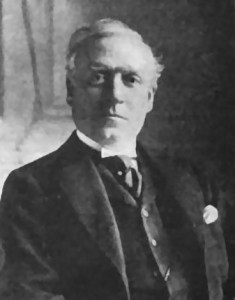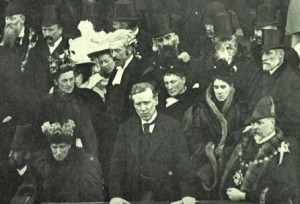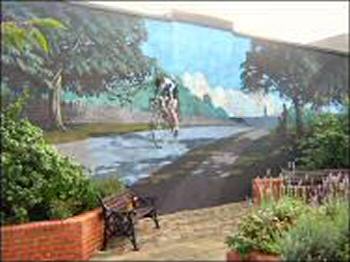Personalities discussed
Herbert Henry Asquith
Beryl Burton
Bobby Peel
Jack Shooter
Herbert Henry Asquith (Politician)

Herbert Henry Asquith, the Liberal Politician, was born in Morley on September 12th, 1852. His father was a local cloth manufacturer and the family lived at Croft House – a listed dwelling still to be found on Church Street in the town. The Asquiths were non-conformists and they attended the Rehoboth Chapel on Dawson Hill. This is now demolished but its graveyard, although overgrown, still exists and it contains the graves of members of his family. In later life Mr Asquith said that he could remember a magnificent parade in 1856 in the town to celebrate the ending of the Boer War.
The Asquith family had many roots in Morley but his father and mother left the town when he was 4 years old, to live in nearby Mirfield. Even so, and perhaps because of these roots, the town followed his illustrious career with great interest. It is just over 100 years since he became Prime Minister in April 1908 and his government introduced many high-reaching social reforms. His premiership ended in 1916 during World War 1 but many scholars such as Roy Jenkins have found him a public figure well worthy of study.
This busy and accomplished man, who enjoyed the social life of London as well as the political cut and thrust, still found time for his birthplace and his visits, when he had attained national acclaim, have had important local consequences. In 1895 he opened the newly-built Town Hall and in 1913 he accepted the Freedom of the Borough. These will be dealt with in depth elsewhere. In 1906 as Chancellor of the Exchequer of the new Liberal Government he told a packed house in the Town Hall of his plans for the future and was greeted rapturously.

He was ever-willing to help the town when he could, giving important support to the opening of a local Magistrate’s Court in 1893 and encouraging, at a time of great personal pressure during World War 1, George Wood’s history of Morley.
Shortly after he died on February 15th, 1928, his colleague and friend, the Liberal MP Sir William Middlebrook arranged that a memorial bust be erected in the Town Hall to celebrate his life and achievements. His daughter, the writer and broadcaster Violet Bonham Carter gladly gave information about her beloved father and she continued the link, first made when her father received the Freedom of the town, for much of her life.
Beryl Burton OBE (Cyclist)
She was born Beryl Charnock in Leeds on 12 May 1937, and suffered from rheumatic fever as a child, resulting in speech difficulties. She left Stainbeck secondary school at fifteen, and went to work as a clerk in a clothing factory where she met Charlie Burton, eight years her senior. They married in 1955 and Charlie introduced her to club cycling and then competitive racing, a sport that she dominated for over quarter of a century by winning fifteen world championship medals and 120 British national titles.
For her achievements, Beryl was awarded the MBE in 1964 and an OBE four years later, but in Britain few heard of her outstanding success due to the poor coverage given to women’s cycling by the media.The Burtons were not well off, and had to finance many of her early trips abroad themselves, but she refused to turn professional. Charlie worked as an accounts clerk and spent much of his time managing his wife’s cycling career, while Beryl earned some income and kept fit by working in local market gardens and rhubarb farms. She also stayed loyal to Morley cycling club, even though it was never sponsored by the cycle industry.

In 1988, she won her last national title, but continued to ride in national championships because she loved the sport, and was scheduled to ride in the national 10 mile time trial the day before her fifty-ninth birthday. Sadly, on 5 May 1996 she died of natural causes during a training run and was found lying beside her bike in Skipton Road, Harrogate. She was survived by her husband, Charlie, and daughter, Denise.
Robert (Bobby) Peel (Test & County cricketer)
Born in Churwell on 12 February 1857, Bobby Peel was one of the finest all round cricketers of any time. Primarily a slow left-arm bowler, he first played for Yorkshire in 1882, but it was several years before he achieved distinction. For nine seasons, he regularly took over 100 wickets, his county total amounting to 1,550 at an average of 15 runs each. Against Somerset in 1895, he took 15 wickets in 36 overs for 5 runs, nine for 22 in one innings, causing a sensation. His full return in bowling in first-class cricket was 1,754 wickets at an average of 16.21 runs each. He played for England twenty times against Australia, travelling there in 1884-5, 1887-8, 1891-2 and 1894-5, and in Test matches he took 102 wickets for less than 17 runs each. At Sydney in 1894, thanks to his efforts, England gained an extraordinary win by 10 runs after facing a total of 586, which at the time was a record for these Tests.
As a batsman, Bobby Peel scored over 11,000 runs for Yorkshire, including two centuries. His highest innings was 226 not out against Leicestershire in 1892, and he contributed 210 not out in a Yorkshire score of 887 against Warwickshire in 1896, a total which is still a county match record.
In 1897, Lord Hawke sent him off the field during a game at Bramall Lane, following which he was suspended for the remainder of that season, and did not play for Yorkshire again. His benefit match at Bradford in 1894 realised £2,000, and he died in Morley, aged 84, on 12 August 1941.
Jack Shooter (Rugby International)
Born: 25 March 1875 in Nottingham, but the family moved to Morley shortly afterwards.
1893: Debut for Morley
1896: First Yorkshire RU cap
1899: England cap versus Ireland. 4 international caps in all
1900: Joins Hunslet RL club
1905-07: Hunslet RL ‘pack’ known as the ‘Terrible Six’
Died: 13 August 1922, leaving a widow and 6 children.
A benefit was organised but it was badly mismanaged and the money was stolen.



You must be logged in to post a comment.